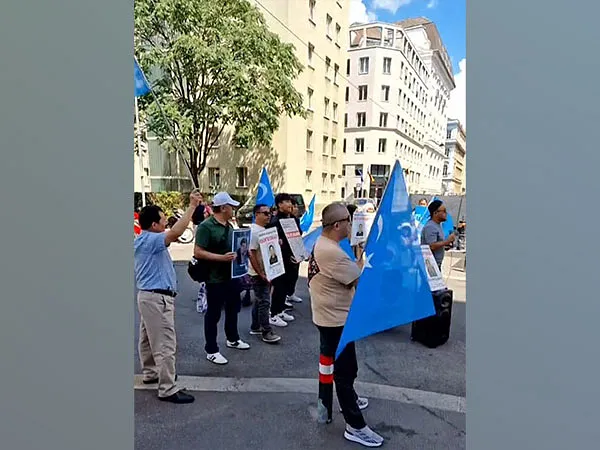Uyghur diaspora in Vienna organized a protest in front of the Chinese embassy to mark the 13th anniversary of the Urumqi massacre on Thursday at 1400-1600 hr (local time).
They had also organized a protest on Wednesday, where 12-15 members of the Uyghur Diaspora were present carrying posters and flags condemning the Urumqi massacre.
Mevlan Dilshat who is the president of the Uyghur community in Vienna said that they have gathered to protest against the massacre that occurred on July 5 in Urumqi and to remember the ongoing genocide taking place in East Turkestan.
On July 5, 2009, violent riots broke out in Urumqi, the capital city of Xinjiang. The Chinese government launched a crackdown against Uyghurs protesting against the killing of two Uyghurs. Thousands of protestors were killed, disappeared or injured.
According to officials, a total of 197 people died, with 1,721 suffered injuries in the riot.
Uyghur-run mosques were temporarily closed. By November 2009, over 400 individuals faced criminal charges for their actions during the riots. Nine were executed in November 2009, and by February 2010, at least 26 had received death sentences.
Reports from non-governmental organizations based on interviews with eyewitnesses indicated that security forces deliberately used live ammunition during the protest.
To mark the 13th anniversary of the riots, protests were organised in several cities around the world.
Protests were held in several parts of Bangladesh to commemorate the 13th anniversary of the Urumqi massacre.
To mark the 13 anniversary of the riots, several demonstrations were held in places including Dhaka and Narayanganj.
In Narayanganj, people holding banners and posters created human chains and demonstrated against the Chinese communist government’s oppression of Uyghurs, with the support of Sanchetan Nagorik Samaj.
A discussion meeting was organised at National Press Club in Dhaka and the formation of a human chain and demonstration took place under the banner of the Bangladesh Social Activist Forum.
Bharat Bangladesh Sampriti Sangsad (BBSS) Welfare forum organised a cycle race in Dhaka, which was attended by a large number of people, coming forward in support of minority communities on the Chinese mainland.
Members of the Australian Uyghur Tangritagh Women’s Association (AUTWA) on Tuesday protested outside the Rundle Mall in Adelaide city here commemorating the 13th anniversary of the Urumqi Massacre and demanded the Australian government to ban import on goods manufactured by Uyghur Forced Labour from China’s Xinjiang region.
The Urumqi protest organised by AUTWA with the support of UFF was attended by roughly 15 members along with some children and teenagers from the community.
To mark the 13th anniversary, the protestors gathered at the Silver Balls sculpture at the Rundle Mall, holding placards and pictures of those who died in the riots demanding the government to stop the Uyghur’s genocide.
During the protest, there was a petition to collect signatures from the public. People were asked to sign the petition demanding the Australian government to ban the import of products made through Uyghur Forced Labour from China’s Xinjiang region.
“We need your signature to make sure no product made by forced Uyghur labour enters Australia. Sign a petition to ask the government to stop the Uyghur genocide and Uyghur forced labour. Not just Uyghur forced labour but stop forced labour across the world. We cannot be complicit; we cannot buy products that say, made by blood tears and people lives,” said a member of the AUTWA.
AUTWA also launched an online media campaign for the event. The clips of the event have been watched more than 1000 times. In the Uyghur language, the campaign launching video has been watched over 1,000 times on Facebook. In support of this, many people changed their profile pictures to the posts.
On Twitter and Instagram, more than 100k people viewed the post and it was shared over 150 times.
Subjecting minority groups to genocide, including mass arbitrary detention, forced labour, torture, forced sterilization, separation of children from parents and destruction of minority culture, China has been a major cause of human rights abuses against the community.

